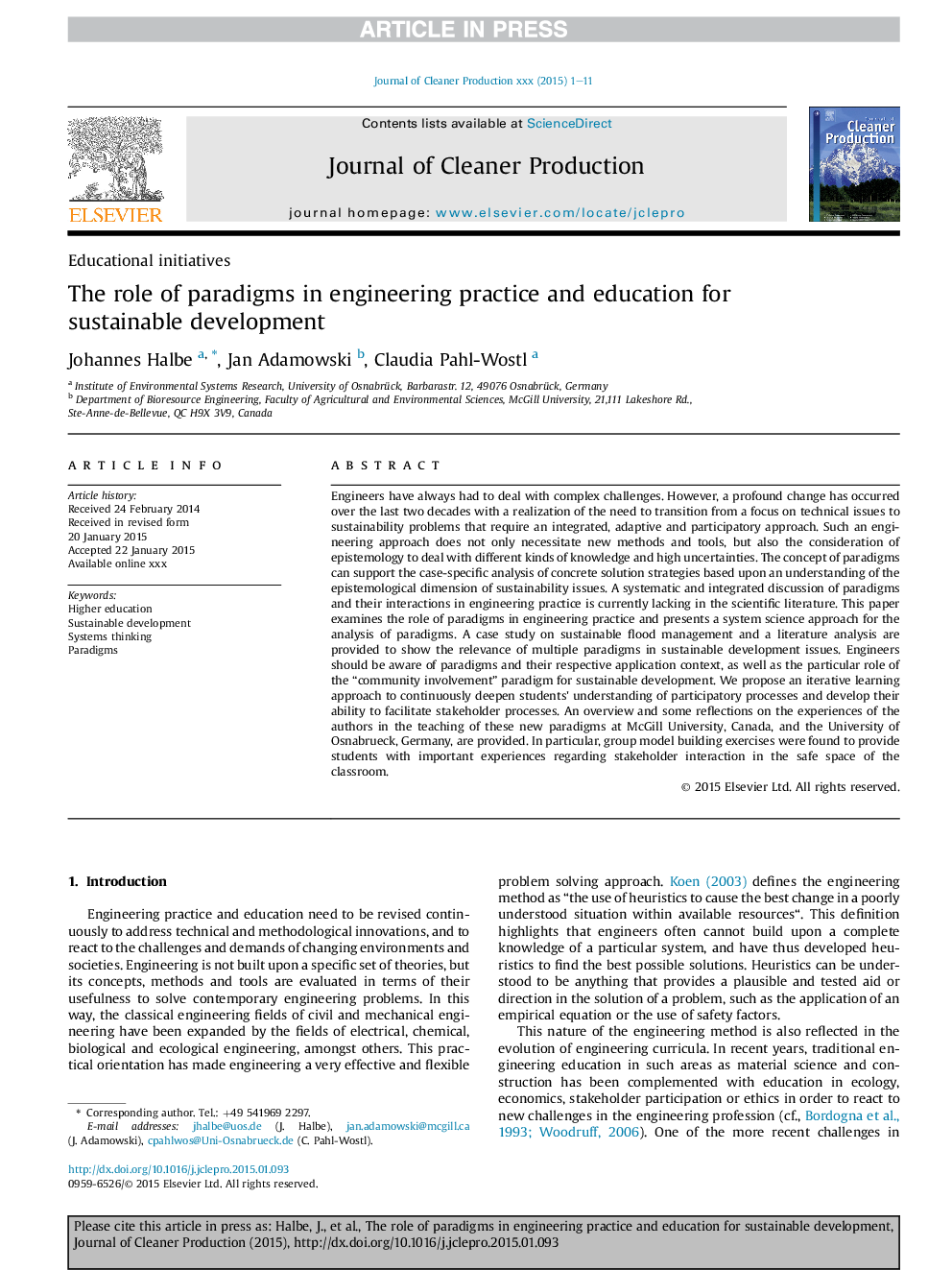| کد مقاله | کد نشریه | سال انتشار | مقاله انگلیسی | نسخه تمام متن |
|---|---|---|---|---|
| 8103185 | 1522140 | 2015 | 11 صفحه PDF | دانلود رایگان |
عنوان انگلیسی مقاله ISI
The role of paradigms in engineering practice and education for sustainable development
ترجمه فارسی عنوان
نقش پارادایم های عملی مهندسی و آموزش برای توسعه پایدار
دانلود مقاله + سفارش ترجمه
دانلود مقاله ISI انگلیسی
رایگان برای ایرانیان
کلمات کلیدی
آموزش عالی، توسعه پایدار، تفکر سیستمی، پارادایم ها،
ترجمه چکیده
مهندسان همیشه باید با چالش های پیچیده مقابله کنند. با این وجود، تغییر عمیق در دو دهه گذشته با درک نیاز به انتقال از تمرکز بر مسائل فنی به مسائل پایداری که نیازمند رویکرد یکپارچه، انطباقی و مشارکتی است، رخ داده است. چنین رویکردی مهندسی نه تنها نیازمند روشها و ابزارهای جدید است، بلکه همچنین معرفت شناسی را برای مقابله با انواع مختلف دانش و عدم اطمینانهای بالا مورد نیاز است. مفهوم پارادایم ها می توانند از تجزیه و تحلیل خاصی از راه حل های راه حل بنیادی بر اساس درک معانی معرفت شناختی مسائل پایداری حمایت کنند. در حال حاضر در ادبیات علمی یک بحث سیستماتیک و یکپارچه از پارادایم ها و تعاملات آنها در عمل مهندسی وجود ندارد. در این مقاله نقش پارادایم ها در عملکرد مهندسی بررسی شده و رویکرد علمی سیستم را برای تحلیل پارادایم ها ارائه می دهد. مطالعه موردی در مورد مدیریت پایدار سیلاب و تجزیه و تحلیل ادبیات به منظور نشان دادن ارتباط پارامترهای متعدد در مسائل توسعه پایدار ارائه شده است. مهندسان باید از پارادایم ها و زمینه های مربوط به کاربرد خود آگاه باشند، و همچنین نقش خاصی در شرکت های اجتماعی چیست؟ پارادایم توسعه پایدار. ما یک رویکرد یادگیری تکراری را پیشنهاد می کنیم تا به طور مداوم درک دانش آموزان از فرآیندهای مشارکتی را تقویت و توانایی خود را برای تسهیل روند فرآیندهای ذینفع توسعه دهیم. یک مرور کلی و برخی از بازتاب های تجربیات نویسندگان در تدریس این پارادایم های جدید در دانشگاه مک گیل، کانادا و دانشگاه اسنابروک، آلمان ارائه شده است. به طور خاص، تمرینات مدل سازی گروهی برای دانش آموزان با تجربیات مهم در مورد تعامل با متقاضیان در فضای امن کلاس درس ارائه شده است.
موضوعات مرتبط
مهندسی و علوم پایه
مهندسی انرژی
انرژی های تجدید پذیر، توسعه پایدار و محیط زیست
چکیده انگلیسی
Engineers have always had to deal with complex challenges. However, a profound change has occurred over the last two decades with a realization of the need to transition from a focus on technical issues to sustainability problems that require an integrated, adaptive and participatory approach. Such an engineering approach does not only necessitate new methods and tools, but also the consideration of epistemology to deal with different kinds of knowledge and high uncertainties. The concept of paradigms can support the case-specific analysis of concrete solution strategies based upon an understanding of the epistemological dimension of sustainability issues. A systematic and integrated discussion of paradigms and their interactions in engineering practice is currently lacking in the scientific literature. This paper examines the role of paradigms in engineering practice and presents a system science approach for the analysis of paradigms. A case study on sustainable flood management and a literature analysis are provided to show the relevance of multiple paradigms in sustainable development issues. Engineers should be aware of paradigms and their respective application context, as well as the particular role of the “community involvement” paradigm for sustainable development. We propose an iterative learning approach to continuously deepen students' understanding of participatory processes and develop their ability to facilitate stakeholder processes. An overview and some reflections on the experiences of the authors in the teaching of these new paradigms at McGill University, Canada, and the University of Osnabrueck, Germany, are provided. In particular, group model building exercises were found to provide students with important experiences regarding stakeholder interaction in the safe space of the classroom.
ناشر
Database: Elsevier - ScienceDirect (ساینس دایرکت)
Journal: Journal of Cleaner Production - Volume 106, 1 November 2015, Pages 272-282
Journal: Journal of Cleaner Production - Volume 106, 1 November 2015, Pages 272-282
نویسندگان
Johannes Halbe, Jan Adamowski, Claudia Pahl-Wostl,
